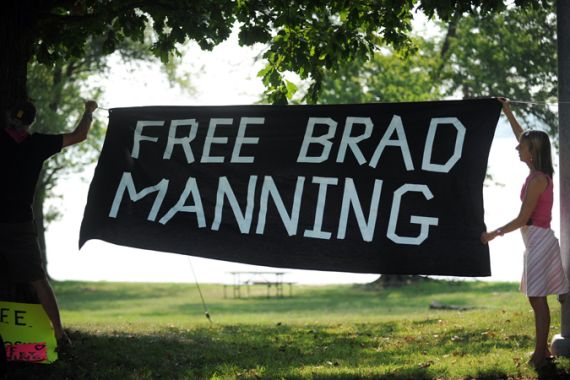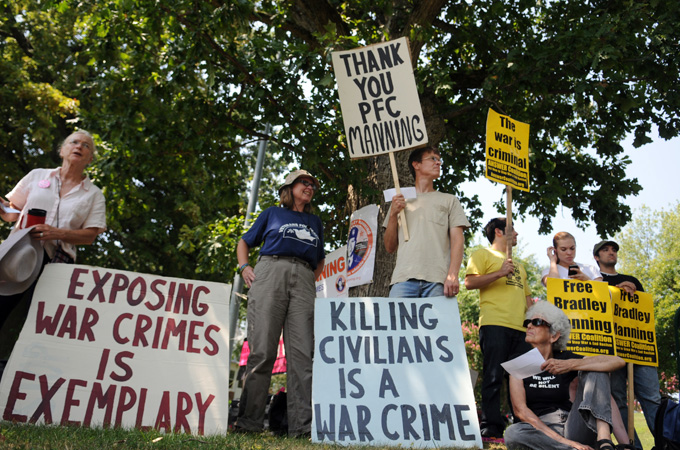No justice for Bradley Manning
The US government has made an example of Bradley Manning to prevent others from challenging the American empire.

 |
| Protestors take a stand against the way Bradley Manning has been treated by the US government [EPA] |
Washington, DC – Private Bradley Manning was just 22 years old when he allegedly leaked hundreds of thousands of US State Department cables and video evidence of war crimes to the whistle-blowing website WikiLeaks. For that act of courage that revealed to the world the true face of the American empire, he faces the prospect of spending the rest of his life in prison.
After waiting more than 18 months, half of which he spent in torturous solitary confinement that he was only removed from after an international outcry and the resignation of a top State Department official, Manning is finally getting a shot at justice – if we can think of a military court as justice – when his case moves to the pre-trial hearing phase this Friday. But whether Manning is ultimately found guilty or not is beside the point: All one needs to know about American justice is that if he had murdered civilians and desecrated their corpses – if he had the moral capacity to commit war crimes, not the audacity to expose them – he’d be better off today.
Indeed, if Manning had merely murdered the nameless, faceless “other”, as his Army colleagues on the notorious Afghan “Kill Team” did, he would not have had his right to a speedy trial blatantly violated. If Manning had intentionally killed unarmed civilians, posed for pictures with their dead bodies and slashed their fingers off as souvenirs, he would not have had his guilt publicly pronounced by his own commander-in-chief, President Barack Obama, months before he so much as saw the inside of a military court. If he had killed poor foreigners instead of exposing their deaths, he might even stand a chance of getting out of prison while still a young man.
This isn’t really a head-scratching development. While killing unarmed civilians for sport m
|
Other young soldiers thinking of telling the truth about America’s wars must by now have surely gotten the message: if you see something, don’t say something. |
ay not be officially sanctioned policy, it doesn’t threaten the functioning of the war machine as much as a soldier standing up and refusing to be complicit in mass murder. From the perspective of a Washington establishment much more concerned with maintaining hegemony than its humanity, the former – murder – is much less troubling a precedent than the latter.
And so the US government is making an example of Manning, lest any other cogs in the machine start thinking about listening to their consciences instead of their commanders.
Other young soldiers thinking of telling the truth about America’s wars must by now have surely gotten the message: if you see something, don’t say something. Meanwhile, Manning couldn’t be faulted for wondering why he did not just take a cue from his commander-in-chief and kill some innocent foreigners like a good American boy. Instead of facing a lifetime in prison, he might have been up for a medal.
Had Manning – instead of exposing the crime – been the one pulling the trigger in the US Apache helicopter that in 2007 murdered at least a dozen unarmed people in Baghdad, he wouldn’t be facing any legal consequences for his actions. Had Manning authorised a 2009 missile strike in Yemen that killed 14 women and 21 children, instead of releasing the State Department cable that acknowledges responsibility for the killings, we wouldn’t even know his name.
But Manning didn’t kill anybody. Rather, he was outraged by the killing he saw all around him and angered at the complicity of his higher-ups who weren’t prepared to do a damn thing about. So, the system having failed to ensure accountability, Manning took it upon himself to share the inconvenient facts his government was withholding from the world.
“I prefer a painful truth over any blissful fantasy”, he explained in a chat with hacker-turned-informant Adrian Lamo. As an Army intelligence analyst, Manning witnessed firsthand the American empire in action – and it changed him. “I don’t believe in good guys versus bad guys anymore”, he lamented, “only a plethora of states acting in self-interest”.
Confronted with the reality of institutional evil, Manning risked his career – and his freedom – in order to expose everything from mass murder and child rape in Afghanistan to US support for brutal dictators across North Africa and the Middle East. His actions were heroic, and Amnesty International has even credited them as the spark for with jump-starting the Arab Spring. And yet a president who proclaims his commitment to transparency while on the campaign trail is determined to go down as the one whose administration mentally tortured, prosecuted and jailed the most famous whistle-blower in half-a-century.
Colonel Ann Wright, a former top State Department official who resigned in protest of the 2003 Iraq war, says Manning’s treatment at the hands of the Obama administration is an outrage that is at odds with the norms of military justice. He’s been treated “as if he were an enemy combatant in Guantanamo”, she says. “His past treatment while in pre-trial confinement and the lack of compliance with the norms of the military legal system of a ‘speedy’ trial . . . reeks of 18 months of intimidation, retribution and retaliation.”
“It’s clear the military and those tasked with Manning’s case are working hard to make an example of him”, says Nathan Fuller, an activist with the Bradley Manning Support Network. Like many, he suspects Manning’s treatment has at least in part been an attempt to get him to implicate WikiLeaks founder Julian Assange. But even if the Obama administration can’t get that, “they’re more than happy to use his case to send a message to potential whistle-blowers everywhere”.
Politicians aren’t the only ones who can send a message. This weekend, activists from around the country, including those involved in the Occupy movement in nearby Washington, DC, will be rallying outside Maryland’s Fort Meade, where the pre-trial hearings in Manning’s case are being conducted. The hope is that they can convince President Obama and his military brass that punishing a whistle-blower goes against the wishes of the American public. The question is whether that’s true – and whether the political establishment really cares.
Charles Davis is an activist and writer who splits his time between Washington, DC, and Nicaragua. He is a contributor to the newswire Inter Press Service and his work has aired on public radio stations across the United States. To read more of his work, visit his website.
Follow Charles on twitter: @charlesdavis84
The views expressed in this article are the author’s own and do not necessarily reflect Al Jazeera’s editorial policy.
